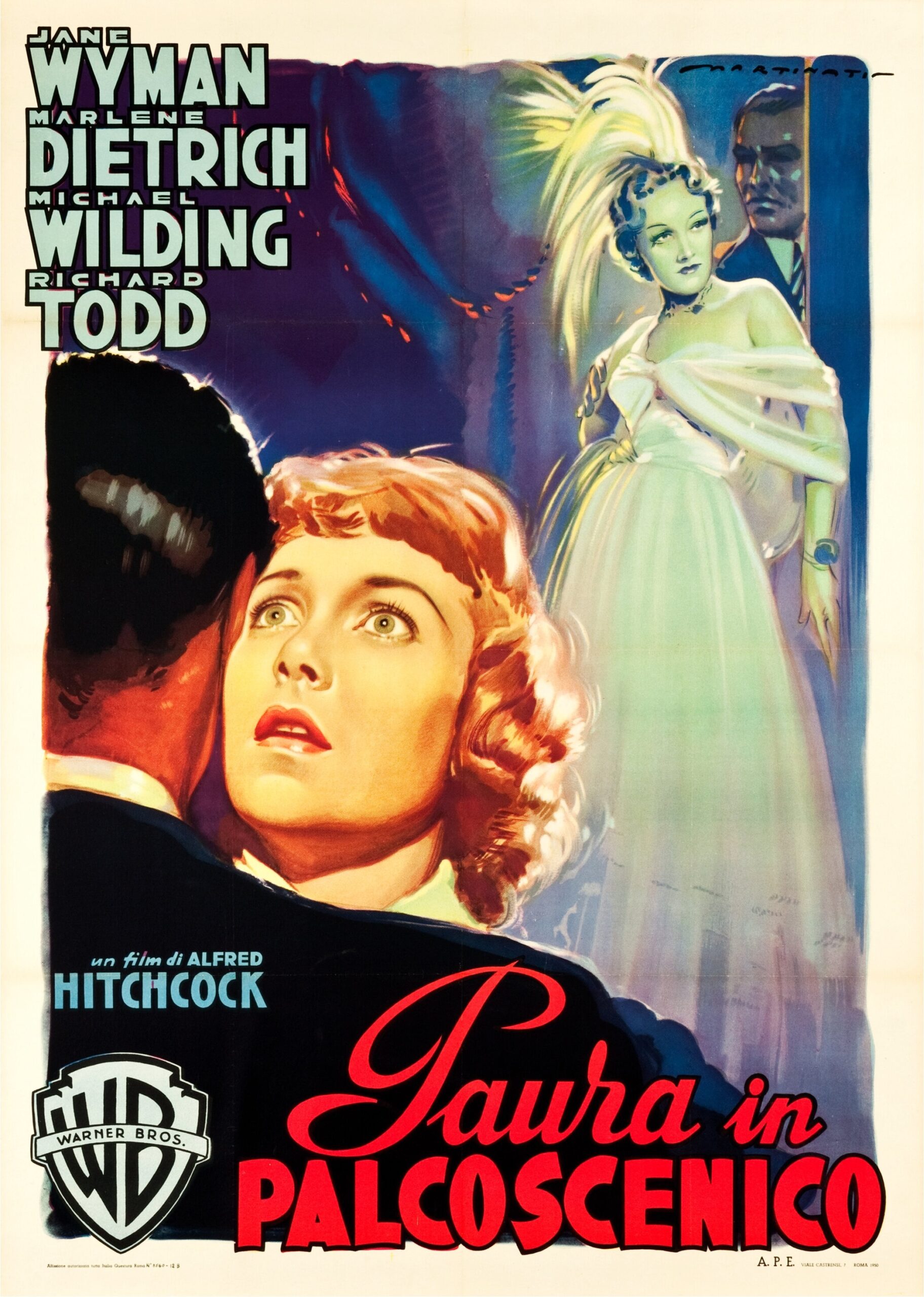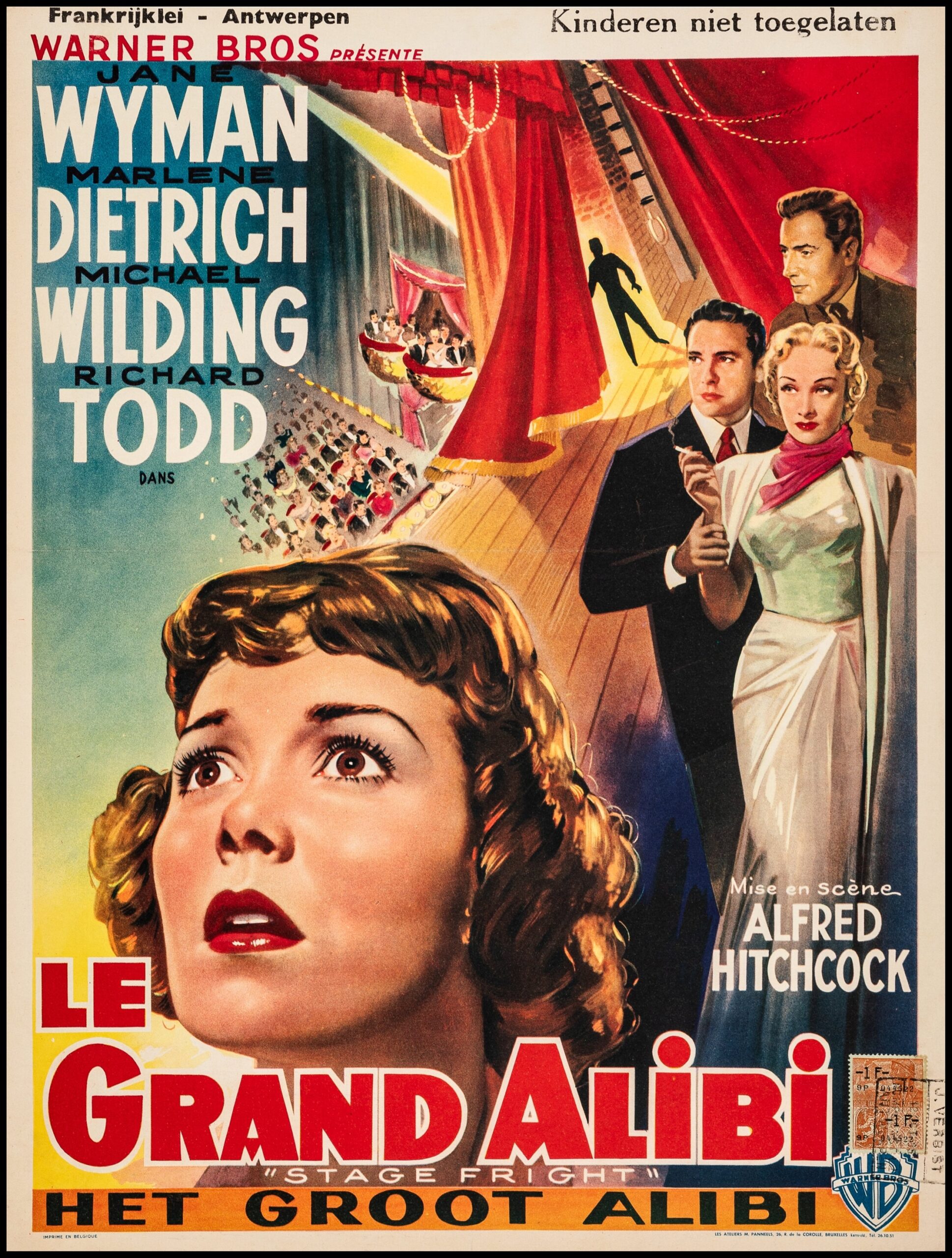- Revisiting contemporary and modern critical appreciation
- Alfred Hitchcock’s thriller confounded audiences then and now
- The film world is but a stage: theatrical intrigue behind the scenes
Note: this is part of an ongoing series of 150-odd Hitchcock articles; any dead links are to those not yet published. Subscribe to the email list to be notified when new ones appear.
Collectors Guide: Stage Fright

US Warner LaserDisc (1991)
The role of your life may be the cause of your death.
Alfred Hitchcock always loved the theatre and delighted in taking his audiences there. The repertory theatre of Murder!, the music hall of The 39 Steps, the little cinema of Sabotage, the huge Radio City Music Hall in Saboteur and Royal Albert Hall in The Man Who Knew Too Much [and its remake], all became sinister settings in which danger and excitement lurked in the wings to wreak havoc upon his characters. Firmly rooted in that entertaining tradition is Stage Fright, Hitchcock’s witty and suspenseful murder mystery in which the characters are never what they seem and a predilection for role-playing could get a person killed.
Academy Award winner Jane Wyman (Johnny Belinda, The Yearling, TV’s Falcon Crest) plays Eve Gill, a drama student who envisions the “acting challenge” of a lifetime in the desperate predicament of friend [and crush] Jonathan Cooper (Richard Todd) who is being framed by flamboyant stage star Charlotte Inwood (movie legend Marlene Dietrich) for her husband’s killing. To prove Jonathan’s innocence and Charlotte’s guilt, Eve impersonates a maid and goes to work for Charlotte. For Eve, undercover work is like playing a game, but she’s about to encounter other “actors” who are playing for keeps.
Filming in his native England, Hitchcock merrily juggles elements of humor and whodunit from the opening curtain to a harrowing climax that is one of the master’s most riveting and, naturally, theatrical. Another marvelous asset is the supporting cast of players, rivalling the great ensembles of his earlier British classics The 39 Steps and The Lady Vanishes. Alistair Sim, who would achieve screen immortality a year later in the definitive version of A Christmas Carol; and Dame Sybil Thorndike, equally at ease playing middle-class matrons and dowager duchesses, deftly handle the roles of Eve’s divorced parents. Joyce Grenfell brings her hallmark nuttiness to a rain-dampened garden party scene.
Representing the glamour and the bitchiness of the theatre, Dietrich makes the vain, manipulative Charlotte one of her most colorful characterizations, and her rendition of Cole Porter’s “The Laziest Gal in Town” is sexy, provocative and dyed-in-the-wool Dietrich. No one turns a theatre into a bastion of darkness, deceit and dread like Alfred Hitchcock and Stage Fright is proof positive. – US Warner VHS/Betamax (1985) and VHS/LD (1990/1991) LDDb
Live from DVD An Evening with Dietrich (1972) | 4-CD Der Blonde Engel: Die Retrospektive (2001)
Whitfield Cook’s screenplay about murder in theatrical circles begins auspiciously with young Jonathan Cooper (Richard Todd) commandeering Eve Gill (Jane Wyman) to help him elude the police. According to Cooper, his lady love—a musical-comedy star called Charlotte Inwood (Marlene Dietrich)—has whopped her deserving husband over the head with a poker, and circumstances may point to Cooper as the murderer.
In love with the fugitive despite his infatuation for the sudden widow, Eve takes him to her father (Alastair Sim), a wise old gentleman who gives him sanctuary while Eve—calling on her training as a dramatic student at the Royal Academy—contrives to hire herself out as Miss Inwood’s personal maid. Instead of getting evidence to clear her boy friend, however, she falls in love with the personable detective (Michael Wilding) in the case-which is just as well considering how things are resolved in a hectic though not particularly thrilling denouement.
Actually, it is Alfred Hitchcock’s manipulation of character and antic incident rather than any simulated excitement that makes Stage Fright a pleasure to watch. By reason of his shrewdly humorous characterization of an indulgent father, Alastair Sim dominates the film whenever he is within range of the camera. Even so, there are moments when he is matched by Dame Sybil Thorndike as his perpetually indignant wife and Joyce Grenfell as a monumentally dental barker at a charity bazaar.
Miss Wyman, who was an expert comedienne long before Johnny Belinda revealed her dramatic talent, is attractive here as an ingénue of gullible good will, and Wilding is extremely pleasant as an improbable social detective inspector. Todd does well enough in a role that is a comedown after The Hasty Heart (Newsweek, Jan. 30), but Miss Dietrich has a fine time after her customary fashion, which includes an explicit lyric about “The Laziest Gal in Town” and a terribly blasé reaction to Wilding’s charm. “You can stand just so much of detectives,” she complains. “After all, they’re just policemen with smaller feet.” – Newsweek
Johnny Belinda: trailer, clips, Oscars, TCM
- Warner Prime Video HD
- US: Warner DVD (2006, reissue 2013)
- Italy: Warner DVD (2006)
- Spain: Warner DVD/alt (2006)
- Australia: Warner DVD (2006)
- Japan: Warner DVD (2006)
- Bootlegs: Chile (Cinematekka/set), Italy (A&R), Korea (Art Cinema, unknown, unknown), Spain (Feel, Llamentol)
Reviews: Gladewater Daily Mirror, Glos. Journal, Harrison’s, New Republic, New Yorker, NY Times, Singapore Free Press, Straits Times, Times, Yorks Post
Favorable audience response is assured for this latest Alfred Hitchcock thriller. Made in England with a predominately British cast, it has names of Jane Wyman and Marlene Dietrich to brighten domestic marquees and help ticket sales,
Hitchcock doesn’t stress melodrama throughout. He plays a surprising number of sequences. strictly for lightness, Also, he has a choice cast to put through its paces, and there’s not a bad performance anywhere. The dialog has purpose, either for a chuckle or a thrill, and the pace is good despite the 110 minutes of footage. However, it could be trimmed without hurting overall effect.
Plot is theatrical in that it is played off against a theatre background. Miss Wyman is a drama student who is sought out by a friend, Richard Todd, to save him from the police. Todd is fleeing from the charge of murdering Miss Dietrich’s husband. Miss Wyman and her father, Alistair Sim, hide Todd and turn amateur sleuths in an attempt to prove Miss Dietrich is guilty of the crime. It works out to a surprise ending that effectively wraps up the intricate story threads.
Miss Wyman is delightful as embryo actress but the choice. femme spot goes to Miss. Dietrich. As the musical comedy queen, flamboyant and alluring, she would walk away with the picture were it not for so many other good performances. In the song department she sells “The Laziest Gal in Town” for a sock bit of the show within a show. Michael Wilding clicks as a debonair detective who has to contend with the baffling aspects of the case as well as a yen for Miss Wyman. Todd has a difficult assignment and puts it over with wallop. Finale reveals him as the actual killer, a fact that is well cloaked by his trouping and the writing until the final scenes.
Plot is peopled with a lot of colorful minor characters, some with only single scenes, but they all come to life and add flavor. Standout in the featured parts is Alistair Sim. As his flighty wife, Dame Sybil Thorndike is excellent. Among others contributing strongly are Kay Walsh, Miles Malleson, Joyce Grenfell. Hitchcock had the advantage of a smooth scripting chore by Whitfield Cook, with added dialog by James Bridie. Alma Reville did a good adaptation of a novel by Selwyn Jepson. There’s an extremely fluid lensing contribution by Wilkie Cooper that helps the story’s mood, as does the music score by Leighton Lucas. Full advantage has been taken of the English settings, particularly the London street and theatre scenes in dressing up the sight values of the production. – Brog, Variety
- There Are No Small Parts (2022) – John DiLeo | interview
Collectors Guide: Stage Fright
Related articles
This is part of a unique, in-depth series of 150-odd Hitchcock articles.



